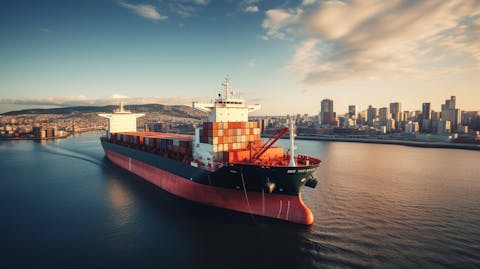Marine shipping is a critical component of the global economy, responsible for transporting approximately 80% of the world’s trade by volume. This industry serves as the backbone of international commerce by facilitating the movement of raw materials, manufactured goods, and energy resources across continents. The maritime shipping industry continues to face significant challenges as geopolitical tensions and security threats escalate in key shipping routes. Shipping companies have been forced to reconsider their routes, with many opting to divert vessels around the Cape of Good Hope, significantly increasing fuel costs and delivery times. These disruptions have far-reaching economic consequences, affecting supply chains and global trade.
Years of Challenges
In an interview with CNBC on November 27, Adrian Beciri, CEO of Ducat Maritime said that marine shipping has faced a series of setbacks over the years, including the disruptions caused by the COVID-19 pandemic, hyperinflation, manpower shortages, and the aftermath of conflicts such as the war in Ukraine and tensions in the Middle East, including the blockage of the Suez Canal. These events have compounded the issues within the marine shipping sector and continue to affect the industry.
Beciri highlighted the intrinsic difficulties of the shipping sector, particularly the demanding nature of the work, coupled with economic challenges that have contributed to a labor shortage in the shipping industry, a problem that is often overlooked by the broader market. The CEO also expressed concerns about the potential impact of the president-elect’s announcement of new tariffs on several countries, which could further complicate supply chains and necessitate a shift towards regional or zonal trading blocks. Such a shift could disrupt the historical patterns of international trade, which are based on the comparative advantages of large nations and the principles of free trade. Looking ahead, Beciri emphasized the importance of stable and consistent markets and policies to foster long-term investments and adjustments within the industry. He called for a conducive environment that would allow firms to make significant investments.
Despite the mounting challenges faced by the maritime shipping industry, it remains an indispensable pillar of global trade. With that in context, let’s take a look at the 10 best marine shipping stocks to buy according to analysts.

A large dry bulk vessel navigating a busy seaport, a testament to the success of the company’s marine transportation services.
Our Methodology
To compile our list of the 10 best marine shipping stocks to buy according to analysts, we used Finviz and Yahoo stock screeners to find marine shipping companies with a market cap of over $500 million as of December 24. From that list, we narrowed our choices to 10 stocks that analysts see the most upside to. We also included the number of hedge fund holders for these companies, which was sourced from Insider Monkey’s Hedge Fund database as of Q3 2024. The list is sorted in ascending order of analysts’ average upside potential, as of December 24.
Why do we care about what hedge funds do? The reason is simple: our research has shown that we can outperform the market by imitating the top stock picks of the best hedge funds. Our quarterly newsletter’s strategy selects 14 small-cap and large-cap stocks every quarter and has returned 275% since May 2014, beating its benchmark by 150 percentage points (see more details here).
10 Best Marine Shipping Stocks to Buy According to Analysts
10. Ship Lease, Inc. (NYSE:GSL)
Upside Potential: 42.20%
Number of Hedge Fund Investors: 22
Stock Price as of December 24: $21.80
Global Ship Lease, Inc. (NYSE:GSL) is a leading owner and operator of mid-sized and smaller container ships, serving the global trade industry with a focus on flexibility and efficiency. The company has a modern and efficient fleet that meets the stringent demands of its liner customers and the regulatory requirements of the maritime industry.
Global Ship Lease, Inc. (NYSE:GSL) is leveraging market dynamics and geopolitical factors to secure favorable charter agreements. The ongoing disruptions in the Red Sea and the resulting rerouting of vessels around the Cape of Good Hope have created a tight market for container ships, particularly in the mid-sized and smaller segments where the company operates. By locking in long-term charters at attractive rates, Global Ship Lease, Inc. (NYSE:GSL) has built a significant forward contract cover, which provides visibility into future cash flows and supports the company’s dividend policy.
Global Ship Lease, Inc. (NYSE:GSL) is actively implementing measures to improve the environmental performance of its fleet. This includes retrofitting vessels to enhance fuel-efficiency, installing automated data capture systems to optimize vessel operations, and ensuring compatibility with low-carbon biofuels. These initiatives aim to support the company in meeting the Carbon Intensity Indicator requirements and enhance its competitive position in the market.
9. Safe Bulkers, Inc. (NYSE:SB)
Upside Potential: 48.76%
Number of Hedge Fund Investors: 11
Stock Price as of December 24: $3.63
Safe Bulkers, Inc. (NYSE:SB) is a provider of marine dry bulk transportation services, specializing in the shipment of major bulks such as coal, grain, and iron ore. The company owns a diverse fleet of 46 vessels.
Safe Bulkers, Inc. (NYSE:SB) is committed to maintaining a young and environmentally efficient fleet. The company has already taken delivery of 11 Phase 3 vessels, all built after 2022, and has an additional seven Phase 3 vessels on order, scheduled for delivery over the next two years. These newbuilds are being constructed at prices well below the current market, ensuring cost efficiency. Additionally, 23 vessels in the fleet have undergone environmental upgrades, and 11 are eco-vessels with superior design efficiencies. The company’s strategy to continually modernize its fleet aligns with the increasingly stringent environmental regulations, positioning the company to meet future greenhouse gas targets and remain competitive in the market.
To enhance operational efficiency, Safe Bulkers, Inc. (NYSE:SB) has implemented the DryBMS Standards Managed System, which is designed to optimize vessel performance and reduce greenhouse gas emissions. The company’s average fleet age of 9.8 years is significantly younger than the global average and contributes to lower maintenance costs and higher operational reliability. Safe Bulkers, Inc. (NYSE:SB) also benefits from a diversified charter portfolio, with a significant portion of its Capes charted on long-term contracts, which provides cash flow visibility and stability.




